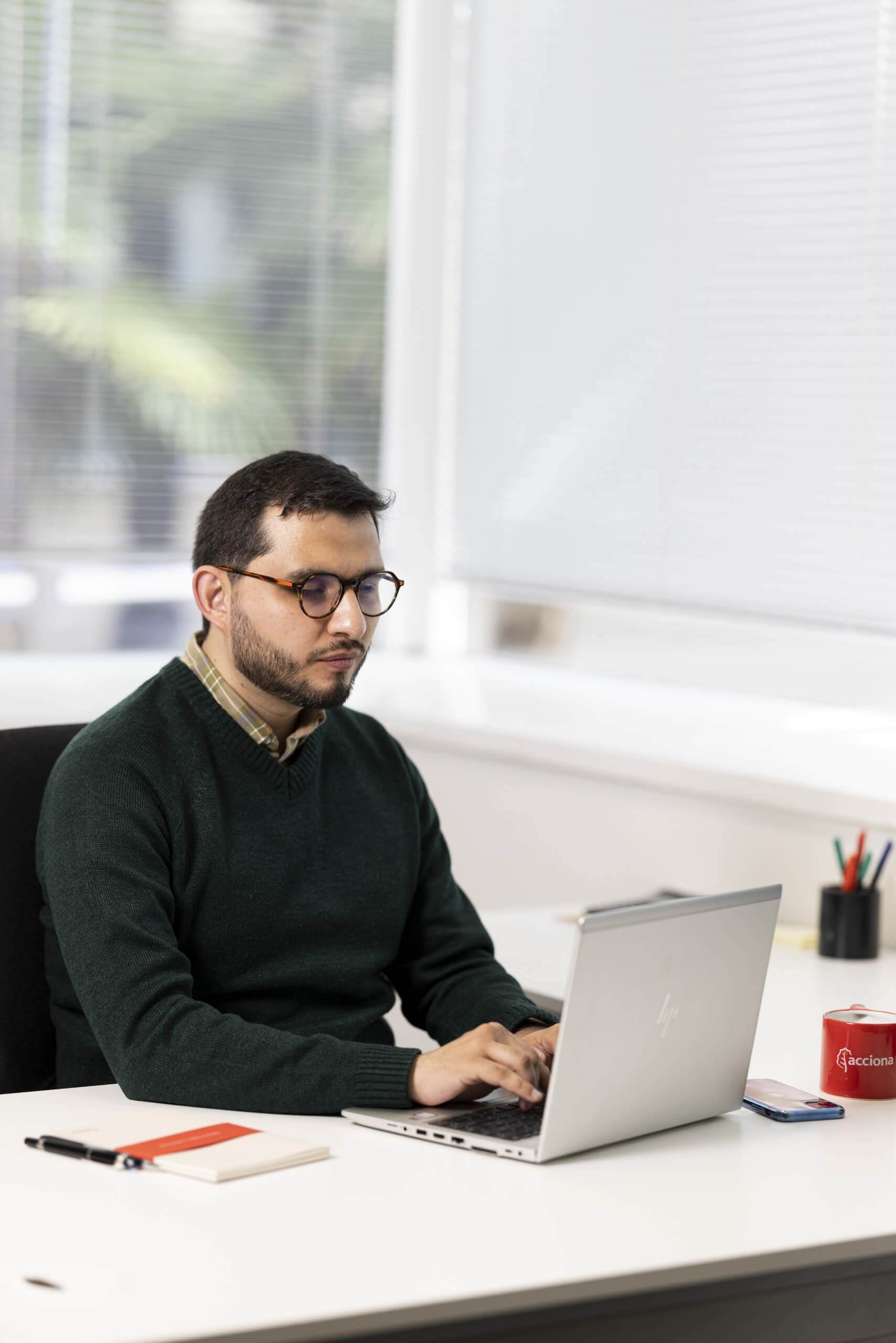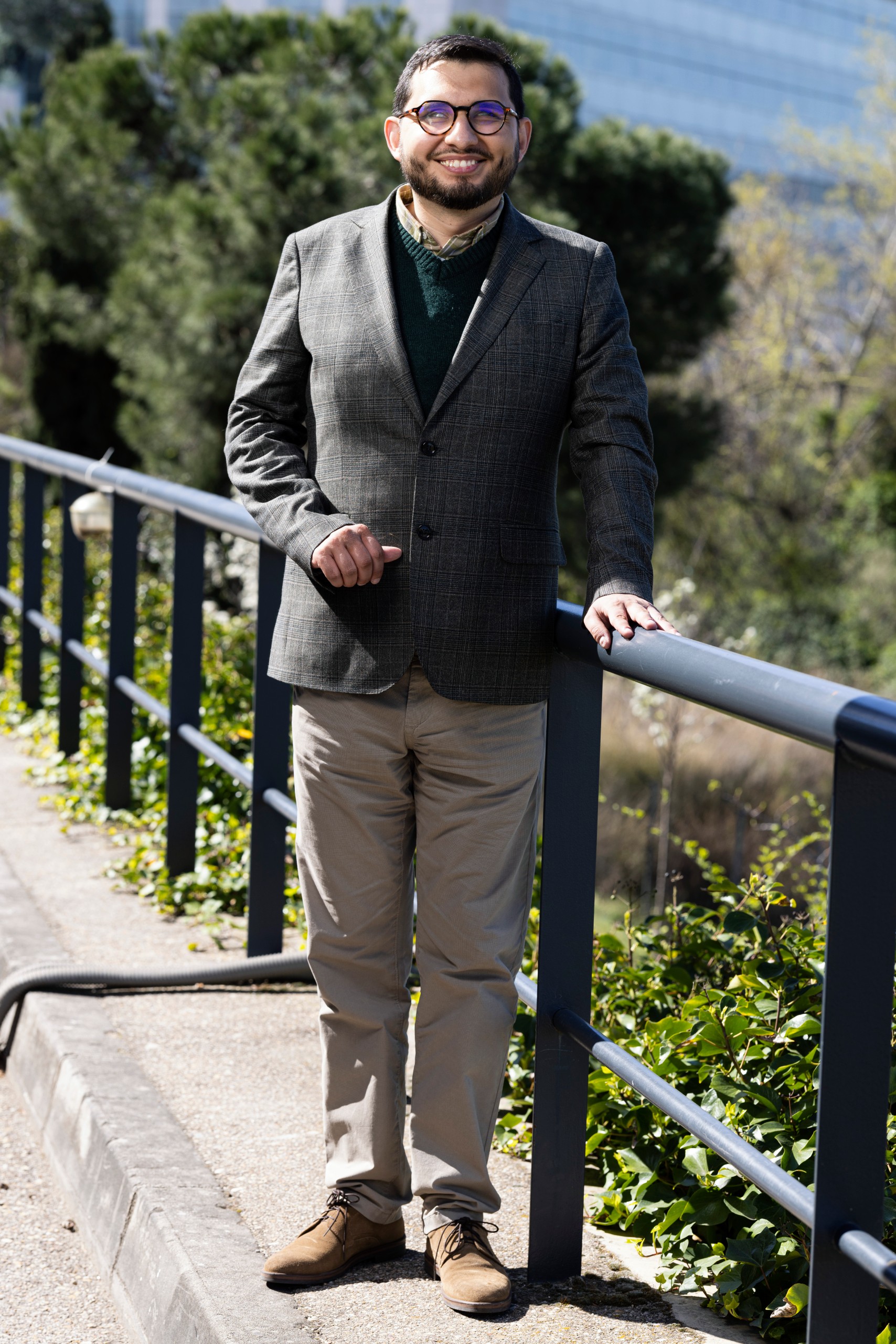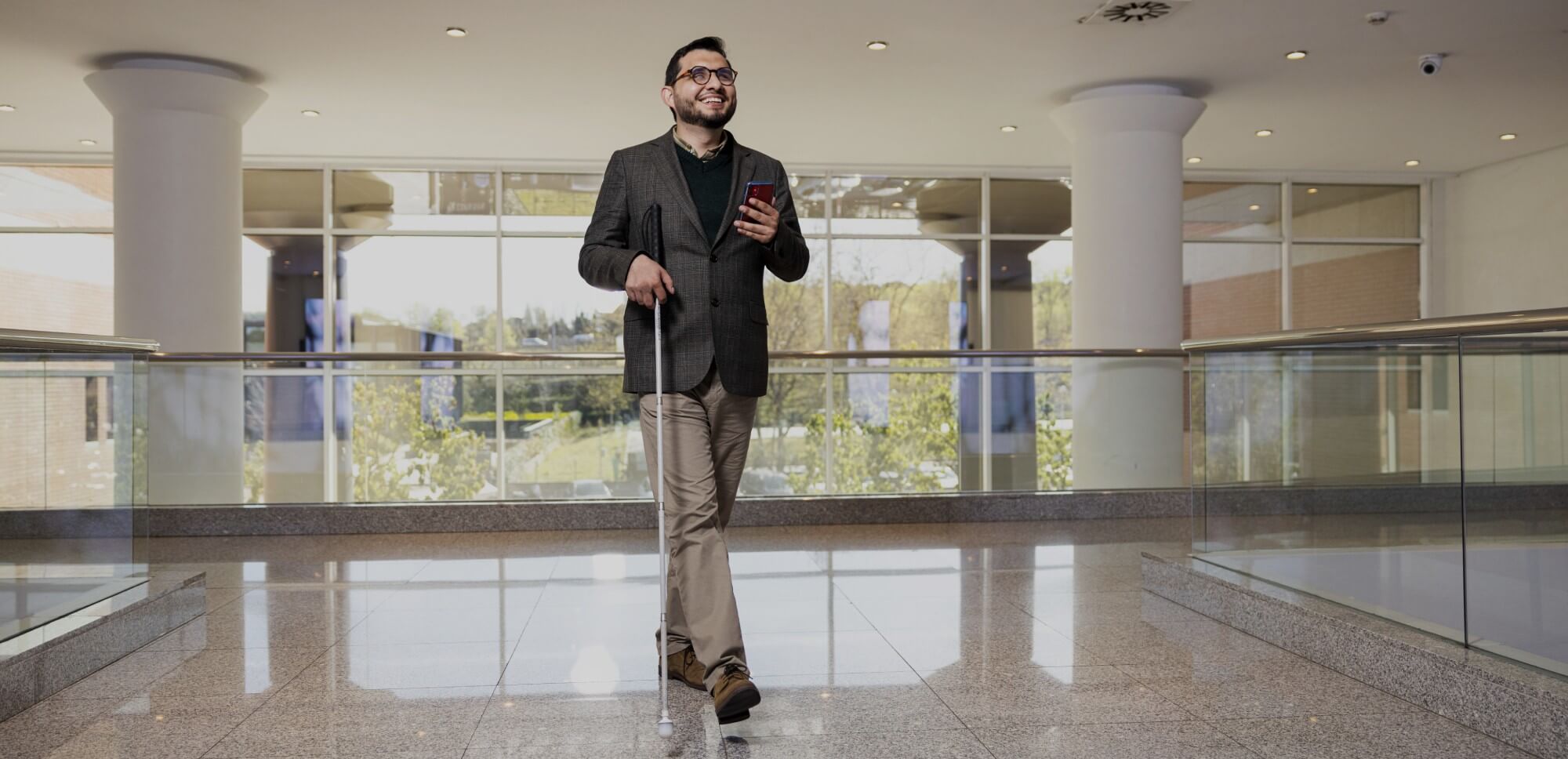Jesús Argumedo brings up the date with the assuredness of someone reciting the multiplication table. That’s when, in his mid-thirties, he saw an advertisement on LinkedIn for a position as Diversity Specialist at ACCIONA. He didn’t think twice: “I saw a Spanish stock exchange company with the possibility of professional growth and a career path. My working conditions at my previous company were good, with a global accessibility department, which is rare in the corporate world”. But that position seemed specially designed for him.
In the interview with ACCIONA, he soon realized that his future position was in a growing department, with many projects ahead of him and, above all, the feeling that he would not simply be filling a disability quota of some kind. Because Argumedo is a person with vision impairment, as he describes himself. It’s a “term that […] maintains the qualification of the person, something that does not happen when you talk about people as the blind,” he explained in an email before the conversation.
The Spanish stock index as a vocation and a mother “with an inclusive vision”
Another date, a little over thirty years earlier: January 14, 1992. But, before explaining it, a little game, reader: think of your first cultural memories. A book, a comic, a series, a television program, or an advertisement. Ready? Very well, it probably doesn’t look like Jesús Argumedo’s. Because one of the first things he remembers is January 14, when the Ibex 35 (the Spanish benchmark stock market index) was founded. That four-year-old boy was fascinated by the news on television and was already enthralled by the business world.
Well, the Ibex and The Simpsons, which he paraphrases shortly after the interview begins. Specifically, a dialogue with which he identifies himself in his professional progression, in his mantra of not setting limits for himself. At a particular moment when Homer is trying to land a plane, a coach tells him: “You have what has made America great, and that is a total ignorance of the limits of your capabilities and an absolute disregard for what others think of those limitations.”
Jesús fires off ideas and concepts relentlessly, with an overflowing passion. He reluctantly confesses that he was a high-ability child: “As early as three years old, I remember perfectly well learning to read and write. And mathematics from the age of four or five: adding, subtracting, multiplying, dividing”. And then, at age six, a cruel fade to black. That was when he lost his sight but not his curiosity.
From then on, his mother, whom he considers “a cornerstone on that path,” began to describe the reality to him – this is what the Pokémon cartoons are like; see what this documentary on TV tells us.

From technology to banking (and a Swedish stint)
But let’s move on to his degree. Jesús is fascinated by the technology industry but is also a self-confessed “brand geek.” So he reasoned: “What degree can help me work in companies I like, regardless of the sector or industry? Well, advertising and public relations, because every company has communications and marketing departments, irrespective of its industry”. So he enrolled in the Faculty of Information and Communication Sciences at the Universidad Complutense of Madrid.
“What degree can help me work in companies I like, regardless of the sector or industry? Well, advertising and public relations, because every company has communications and marketing departments, irrespective of its industry”
One of the characteristics of talent and work is that they make things look easy: that dancer who pirouettes in the air, the lecturer who gives a talk on economics without a paper in hand, the painter who materializes a masterful watercolor with a few loose brushstrokes. Listening to him speak, Jesús conveys the same feeling: he mentions his jobs in multinationals and uses corporate jargon as if it were his natural medium, but nothing could be further from the truth.
“At the age of 24, having a visual disability, I had applied to be an intern in companies and communication consultancies, and in the interviews, it was evident from the questions they asked me that for those who interviewed me, the disability was more relevant than my motivation or studies. Finally, a big company gave me my first opportunity. He refers to his first job at Dell as a marketing intern. Later, following his technological vocation, he moved on to another of the computer giants, Hewlett Packard.
From then on, he developed his career in sustainability, with a resume full of prestigious firms and entities: Banco Santander, a researcher for three and a half years at the Universidad Complutense and Santander Universities, another year and a half at Accenture, and even a stay as a researcher at the Stockholm School of Economics.
And he unleashes another barrage without hardly catching his breath: “In a field in which you would not expect a visually impaired person such as marketing, or in areas such as consulting, where to this day I have not found anyone who is purely and truly dedicated to the world of consulting having a disability, I managed to demonstrate that the fact that I cannot do or see a PowerPoint like the rest of the world does not mean that I cannot manage a client’s profile or cannot develop research or data analysis; and, above all, develop a strategy or provide sustainability training or create marketing communication plans.”
There are many ways to live with a disability. For Jesús it is a backdrop but not a defining feature. That’s why blindness appears indirectly in our conversation. He prefers to speak in terms of talent without labels. “I don’t think I have a vindictive or activist mission. I think the best way to do it, at least for me, from my perception, is in an indirect, normalized way. And later, when I leave, or after many years, someone will say: hey, that can be done”. In the words of Antonio Machado, the Spanish poet, a path made by walking.
However, his personal experience has inevitably marked his interests and fields of specialization in one way or another. It’s time to talk about another of the most significant milestones of his career.
The first cum laude international doctorate in PR with disabilities
Interest in the corporate world, in the way multinationals adopt certain approaches to diversity and inclusion, formed the backbone of what would eventually be the first cum laude doctoral thesis in PR by a visually impaired person in Spain. The topic? Diversity as an intangible asset in companies.
We asked him for a summary, and he offered us some insights: “Right now, there are still companies that do not see the economic, media, and reputational value of diversity and inclusion. It’s hard to see it beyond a philanthropic, charitable point of view, or because it’s a legislative obligation to support gender equality”.

And he gets to the core of his thesis: “Some people think it’s a frivolous way of looking at it. Not for me. I think I have the license to say it both because I have a disability and because I am a doctor and have researched and developed in this field: it is a business opportunity. Why? Because this way you don’t see me as a person in a vulnerable situation or with less capability. No, you see me as a consumer, as a professional, as a customer. If it’s about talking about labels, I want THOSE labels; and that’s what I try to bring from my research”.
And he gives an example very close to his passion for technology: “Apple has the most accessible devices in the world, and why? Because Steve Jobs wanted to create devices accessible to all types of users. He didn’t do it for a philanthropic or charitable aspect, but because he saw a business opportunity; there are millions of people with disabilities in the world.” You could say that Jesús is a practical dreamer or, in his own words, “a down-to-earth idealist.”
As a consumer, as a professional, as a customer. If it’s about talking about labels, I want THOSE labels; and that’s what I try to bring from my research”.
Jesús misses this business vision in many Spanish companies and the ability to translate it in terms of branding. Still, a chapter in his thesis is dedicated to an Ibex company that he sees as an exception. “ACCIONA appears in chapter four, where I talk about good brand management. I think it is somewhat complex to manage a brand like ACCIONA’s because it is so diversified in industries and sectors that good management is complex and, therefore, a recognition of that”. And a couple of years after defending this pioneering thesis, the job opening on LinkedIn arrived.
New challenges at ACCIONA
Let’s return to that March 14 date that opened this article. “I have sent my résumé to companies where I identify myself either with the products or the services, with their corporate identity. Even if the offer is very attractive, if I don’t have that affinity with the company, I don’t do it”. In the case of ACCIONA, he had followed the company for years and was aligned with its values, so he applied soon after seeing the job offer.
Talent is again a differentiating factor: “From the very first moment, ACCIONA made me feel that it hired me for my doctorate, my experience, and my professional career. And my manager emphasizes that every day”. These feelings have been confirmed by reality. He has barely been with the company for half a year, but Jesús already speaks proudly of his achievements.

“From the very first moment, ACCIONA made me feel that it hired me for my doctorate, my experience, and my professional career. And my manager emphasizes that every day”
In his day-to-day work, the protagonist of this article focuses on three main areas: firstly, data analytics and research, i.e., benchmarking equality and inclusion; secondly, communication, transmitting everything that is done in terms of diversity; and finally, reporting.
As for the future, Jesús is clear about his desire to continue contributing to all diversity and inclusion initiatives, promoting “this communication and interaction between all areas, because all areas have the capacity and can contribute to making the company more diverse and inclusive.”
He is also motivated to communicate more and better about the company’s activities: “Based on my training in public relations, I want to highlight even more what ACCIONA does, because we have made great progress in D&I, we take it to the markets where we are, and I am delighted to contribute as an ambassador.”
And he ends up thinking big, just as he did when he was mesmerized by the news of the founding of the Ibex, “working in large companies has always been a motivation – working in what I like, where I like to be, and making valuable contributions. At ACCIONA, I see the opportunity to do so. I believe that I am in a company that sees the world as the local market that it is: it takes into account the diversities, the differences in perception, and the culture of each environment and is aware that all of this enriches the business strategy, the brand, its leadership, and its reputation”.
At ACCIONA we need the best professionals on our team, people who choose to invest their talent in generating a positive impact on the planet. Want to sign up for this commitment? See our job offers here


